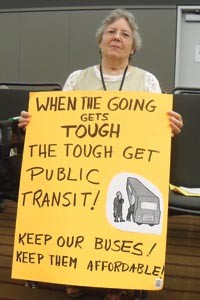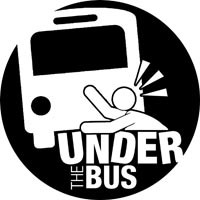Just off the intersection of Murray and Forward avenues sits the Howard Levin Clubhouse, a community for those recovering from mental illness.
Inside, it bustles with activity as members work alongside staff running the clubhouse, fostering skills and self-confidence to re-integrate to society.
The clubhouse's doorway is a few dozen steps from one of the city's busiest transit corridors. Deliberately situated along the bus line, the Squirrel Hill center is served by at least three major routes: 61C, 61D and 64A. Ninety percent of clubhouse members rely on public transportation.
If a threatened 35 percent service reduction and fare increase take effect in January, each of the major routes serving the center will be reduced, though Port Authority hasn't revealed to what extent. Several other routes, bringing members from areas like Jefferson Hills and McKeesport, will be eliminated.
"This is their ticket back into the real world," says director Jessica Feldman, about the center's clients. The Clubhouse is a psychiatric and vocational rehabilitation program, teaching job skills. "If transportation is a major issue, it really limits their capacity to take that first step."
Other human-service agencies have similar fears. Many of their clients live on limited incomes, and rely on the Port Authority. Many agencies -- from the Greater Pittsburgh Food Bank's food pantries to recovery and mental-health programs across the county -- locate along bus lines for just that reason.
When clients are asked what's most important to them, "we consistently hear housing, work and transit," says Pat Valentine, deputy director of Behavioral Health Services in Allegheny County's Department of Human Services. Between 2008-09, more than 55,600 people participated in the department's programs.
Travelers Aid, a nonprofit United Way agency, provides free or reduced-price public transportation for those who can't afford it through county agencies. Annually, the program covers two million trips on Port Authority transport.
TA's employment and training program is one of its most popular, says Executive Director Bob Lindner. That program currently serves 450-500 employees or jobseekers, with a waiting list of 800. The Behavioral Health program serves 700 in mental-health or drug- and alcohol-rehabilitation programs. Both offer bus tickets and passes for a reduced co-pay of $20.
"People don't think about it, but a bus pass is a very powerful tool," Lindner says.
When a previous Port Authority fare increase took effect, Lindner said the job program cut out about 100 people and raised its co-pay from $12 to $20. "Every time there's a fare increase, we have to cut someone out of the program."
Lindner says it's too soon to tell how proposed fare increases -- 25 cents for Zone 1 and 2 fares, as well as a premium charge for more than 20 routes -- could affect the Travelers Aid co-pay. But if partner agencies feel their clients can't absorb a higher cost, Lindner says, officials would have to decide "if the increased costs would be covered by reducing the number of clients they can enroll."
Those living on a fixed income say they may not be able to absorb higher costs. Joanne Fechko, 61, pays $20 for a monthly bus pass through her recovery program, POWER, in Wilkinsburg. As a resident of Naomi's Place, a transitional home in East Liberty, Fechko uses the pass to access a variety of services, including Narcotics Anonymous and Alcoholics Anonymous meetings at least three times a week. Getting around is already a struggle, she says, and sometimes she waits up to an hour for a bus. And while she doesn't blame it on the bus system, Fechko admits transportation has hindered her treatment. "I did relapse because I couldn't get to meetings," she says.
Fechko has been sober for more than a year, and credits the meetings as part of the reason. "I need other people so I can feel like I'm not the only one in the world with this," she says. "I go to meetings and it helps so much."
Indeed, says Valentine, "What we've found is that people who get bus passes, their ability to comply with those pieces of their treatment plan went up."
Such sentiments have been echoed since Port Authority officials proposed the plan to eliminate about 44 bus and light rail routes in July -- cuts officials say are necessary to balance a projected $47.1 million budget deficit next year. Riders' misgivings were expressed at an Aug. 19 public hearing before transit officials.
Some speakers asserted that access to transit helped them decide where to live. Melissanne Myers, for example, moved to the Leland Point housing complex because nearby bus routes connected her with the Levin Clubhouse and an internship. "If I couldn't get to my internship, I couldn't have a better life," she said.
Diane Cagey, of the United Cerebral Palsy/CLASS, told officials her program's staff uses the transit system "at all hours" in order to assist disabled county residents at home.
"Because of these services, people remain in their homes and enjoy the basic civil rights we all want. Many of the people we assist would be forced to live in nursing homes without [UCP]," she said.
Above all, agencies say, mobility means independence. In addition to connecting people with physical and mental needs, transit also offers avenues of socialization. At the Center for Hearing and Deaf Services along Fifth Avenue in Uptown, about half of the intellectually disabled, deaf adults in the Life Skills program rely on the bus to get to the center.
"[Cuts] would add to their isolation, their loneliness. Right now most of them live in group homes where they may be the only deaf person," says David Cummings, coordinator of the Life Skills program. "They come here, where there are 13 other deaf people they can interact with, and they have found utopia."
Public comment on proposed route cuts and fare increases will be accepted by mail until Aug. 31. Send comments to: Heinz 57 Center, 345 Sixth Ave., Floor 3, Pittsburgh, PA 15222-2527 or online at www.portauthority.org.
















